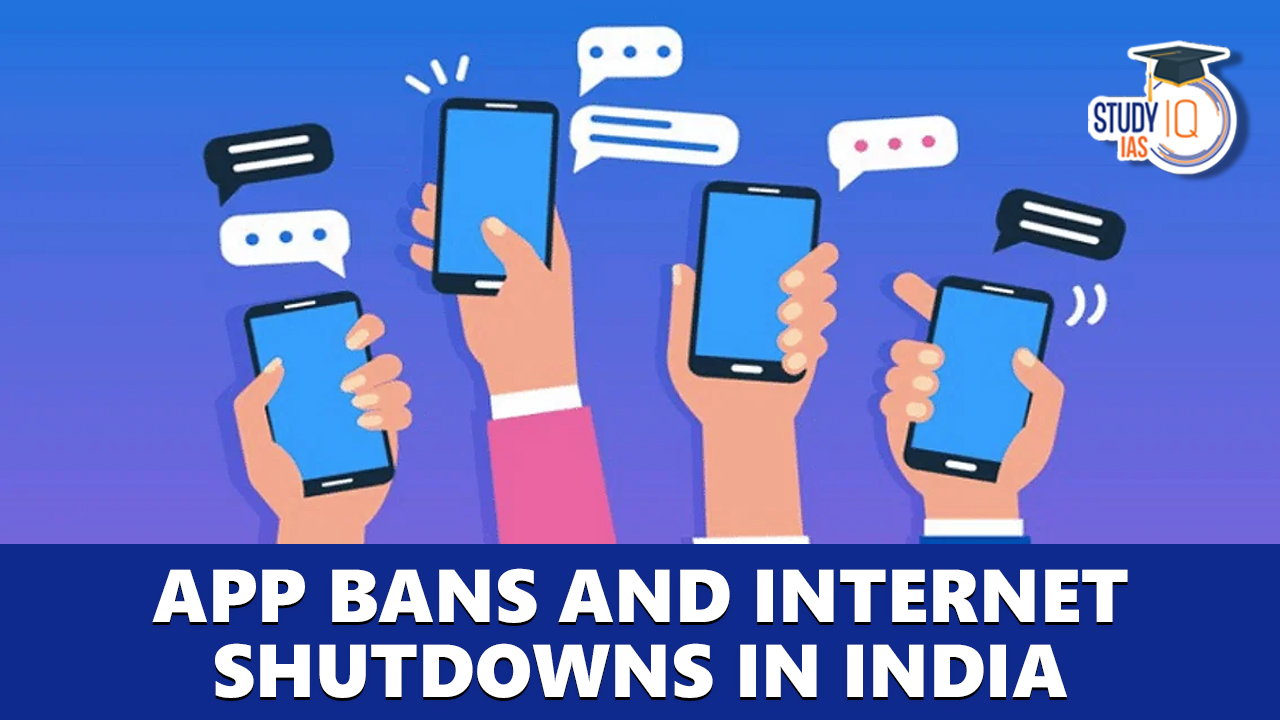Table of Contents
Context: To reduce the impact of internet shutdowns, the Telecom Regulatory Authority of India (TRAI) sought inputs on the possibility of “selective” app bans instead of internet shutdowns.
Background: Internet Shutdowns
What is Internet Shutdown?
- Internet shutdown is defined as an intentional disruption of the internet services in a particular area.
- It can be implemented in different ways, including blocking access to specific websites or platforms, throttling or slowing down internet speeds, or completely cutting off internet connectivity.
- It can be temporary, lasting for a few hours or days, or they can be prolonged, lasting for weeks or even months.
The Rising Trend of Internet Shutdowns in India
- According to a report by Access Now and the KeepItOn coalition, India enforced as many as 84 internet shutdowns in 2022 and was on top of the list for the fifth year in a row.
- Jammu and Kashmir accounted for the highest number of internet shutdowns followed by Rajasthan and West Bengal.
- According to the Access Now report, India witnessed 109 internet shutdowns in the year 2020 against the 155 lockdowns all over the world.
- Instances of major internet shutdowns in India
- Jammu and Kashmir witnessed the longest internet shutdown which started in 2019 with the abrogation of Article 370 was finally lifted after a long gap of 18 months in February 2021.
- The Manipur government banned internet to maintain law and order after ethnic violence broke out in the state. It has been more than 40 days since the internet was shut down in the state.

Legality of Internet Shutdowns in India
- Section 144 of CrPC: Till the year 2017, internet shutdowns were imposed largely under Section 144 of the Code of Criminal Procedure (CrPC).
- Section 144 of CrPC gave the police and the District Magistrate the powers in order to prevent unlawful gathering of people and also to direct any person to abstain from a certain activity.
- However, in 2017, the Government promulgated the Temporary Suspension of Telecom Services (Public Emergency or Public Safety) Rules 2017.
- 2017 Rules provide for a temporary shutdown of telecom services in a region on grounds of public emergency (up to 15 days at once).
- Such directions can be issued by Secretary to the Government of India in the Ministry of Home Affairs in the case of Government of India or by the Secretary to the State Government in-charge of the Home Department in the case of a State Government.
Reasons behind Internet Shutdowns
- National security concerns: Governments may justify that shutting down the internet or specific communication channels is necessary to prevent the coordination of illegal activities, terrorist threats, or to maintain public safety during sensitive periods.
- Political control and suppression: During periods of political unrest, or protests, authorities may restrict access to prevent the spread of information, curb organization efforts, or silence dissent.
- Curbing the spread of misinformation: Governments may enforce internet shutdowns to control the flow of information and combat the dissemination of false or misleading content.
- Preserving national unity or stability: Internet shutdowns may be employed in regions with secessionist movements or conflicts to maintain national unity or stability.
- Preventing exam cheating: Some countries have implemented internet shutdowns during national examinations to prevent cheating and ensure the integrity of the testing process.
Impacts of Internet Shutdowns
- Economic impact: Data from global tracker Top10VPN shows that India suffered a loss of $ 255.2 million due to internet shutdowns, while in 2022, the country suffered a loss of $ 184.3 million.
- Disruption of communication: Internet shutdowns disrupt communication channels, making it difficult for individuals to connect with their loved ones, and access emergency services.
- Limitations on education and research: Internet shutdowns hinder access to online educational resources, e-learning platforms, and research materials.
- Impediment to healthcare services: The internet plays a crucial role in healthcare delivery, including telemedicine, remote consultations, and the access to medical information.
- Impact on fundamental rights: The fundamental rights to speech, conduct business, access to healthcare, express dissent, and movement of people in a state, are compromised.
- Impact on journalism: An internet shutdown can hamper the reach of the on-ground-reporting and cause underreporting of local issues.
- Risk to privacy: For example, when people turn to untrustworthy VPNs in order to route around restrictions, their personal data is at risk.
- Disrupts political transparency: Internet shutdowns undermine or eliminate access to digital tools that are critical for campaigning, promoting public discussion, and overseeing the electoral process.
Selective App Ban Instead of Internet Shutdowns
- A selective app ban refers to the targeted blocking or restriction of specific mobile applications or services during certain periods or in specific regions.
- Instead of imposing a complete internet shutdown, where all internet access is suspended, selective app bans focus on disabling or limiting access to particular apps or services that are deemed to be causing unrest, spreading misinformation, or posing a threat to law and order.
- This approach aims to strike a balance between maintaining law and order and minimizing the disruption caused by a complete internet shutdown, allowing individuals to continue accessing essential services, education, work, and information through other unrestricted apps or websites.
- The approach suggested by TRAI would require telecom operators and messaging app firms like WhatsApp to cooperate with each other and stop access to services during a shutdown.
Concerns with the Selective App Ban
When implementing a selective app ban, Virtual Private Networks (VPNs) can pose challenges.
- Bypassing restrictions: VPNs can be used to bypass selective app bans by tunneling internet traffic through servers located outside the region or country where the ban is imposed.
- Encryption and privacy: VPNs encrypt users’ internet traffic, making it challenging for authorities to monitor or track their online activities.
About VPN (Virtual Private Network)
- VPN is a technology that allows users to establish a secure and encrypted connection over a public network, such as the internet.
- A VPN creates a private network by encrypting the user’s internet traffic and routing it through a server located in a different location or country.
- By using a VPN, users can enjoy several benefits, including enhanced privacy, security, and the ability to access geographically restricted content.

Indian Computer Emergency Response Team (CERT-In) Rules for VPN Providers in India
- VPN companies have to record personal information of their users including names, email id, phone number and IP address for a period of five years.
- They also have to record usage patterns, purpose of hiring services and various other information.
- Apart from VPN companies, data centers, virtual service network providers, cloud service providers have also been asked to record and maintain similar data.
- Entities are also required to report cybersecurity incidents to CERT-In within six hours of becoming or being made aware of them.
Way Forward
- Parliamentary panel recommendations on internet shutdowns: The Standing Committee on Communications and Information Technology report on “Suspension of Telecom Services and Internet and its impact” has recommended-
- Asked the DoT to lay down a clear-cut principle of proportionality and procedure for lifting of shutdown in coordination with the home ministry.
- Rejected the logic of the DoT and MHA for not maintaining the record of the shutdown, saying it cannot simply take the plea that police and public order are essentially state subjects.
- A centralized database of all internet shutdowns can be maintained either by DoT or MHA.
- DoT should expand the review committees under the Telecom Suspension Rules, 2017.
- A study should be commissioned by the government to assess the impact of the internet shutdown on the economy.
- Improving digital literacy: Efforts to enhance digital media literacy should be expanded, and international partners should invest in providing access to basic digital security skills.
- Role of internet companies: Internet companies should collaborate with government and civil society to prevent disruptions caused by shutdowns.
- Defining terms like ‘public emergency’: Clear definitions should be established for terms like ‘public emergency’ to prevent their misuse without valid justification.


 Serious Fraud Investigation Office (SFIO...
Serious Fraud Investigation Office (SFIO...
 Article 142 of Indian Constitution, Sign...
Article 142 of Indian Constitution, Sign...
 Pakistan-Occupied Kashmir (PoK): History...
Pakistan-Occupied Kashmir (PoK): History...





















